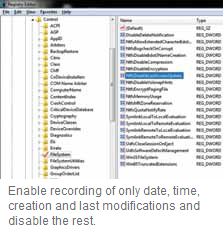NTFS logs the time of every fi le access. But you want only the date and time of creation and last modification, and want to disable the remaining functions.
For this, enter ‘regedit’ in the input field of the start menu and press [Enter]. Then confi rm the security query of the User Account Control. Then browse to the ‘HKEY_LOCAL_MACHINE\SYSTEM\
 CurrentControlSet\Control\FileSystem’ key in the Registry. In the right part of the dialog box, double click the DWORD value ‘NtfsDisableLastAccessUpdate’. Change it to ‘1’ to disable the saving of the time.This is a default setting on some systems. Confi rm the value with ‘OK’ and close the Registry. The access times are no longer logged after the system is restarted.
CurrentControlSet\Control\FileSystem’ key in the Registry. In the right part of the dialog box, double click the DWORD value ‘NtfsDisableLastAccessUpdate’. Change it to ‘1’ to disable the saving of the time.This is a default setting on some systems. Confi rm the value with ‘OK’ and close the Registry. The access times are no longer logged after the system is restarted.
NOTE: Logging all fi le accesses with the times is an extremely practical option for administrators from the point of view of security. As a normal user, you usually do not require these rules. Certain programs like defragmentation programs still use these values.
The disabling should not be a problem. In fact it should accelerate the access to large folders because it makes logging of writing accesses redundant. It is also less rough on SSDs.
For this, enter ‘regedit’ in the input field of the start menu and press [Enter]. Then confi rm the security query of the User Account Control. Then browse to the ‘HKEY_LOCAL_MACHINE\SYSTEM\
 CurrentControlSet\Control\FileSystem’ key in the Registry. In the right part of the dialog box, double click the DWORD value ‘NtfsDisableLastAccessUpdate’. Change it to ‘1’ to disable the saving of the time.This is a default setting on some systems. Confi rm the value with ‘OK’ and close the Registry. The access times are no longer logged after the system is restarted.
CurrentControlSet\Control\FileSystem’ key in the Registry. In the right part of the dialog box, double click the DWORD value ‘NtfsDisableLastAccessUpdate’. Change it to ‘1’ to disable the saving of the time.This is a default setting on some systems. Confi rm the value with ‘OK’ and close the Registry. The access times are no longer logged after the system is restarted.NOTE: Logging all fi le accesses with the times is an extremely practical option for administrators from the point of view of security. As a normal user, you usually do not require these rules. Certain programs like defragmentation programs still use these values.
The disabling should not be a problem. In fact it should accelerate the access to large folders because it makes logging of writing accesses redundant. It is also less rough on SSDs.





0 comments:
Post a Comment
please write your comment
Note: Only a member of this blog may post a comment.